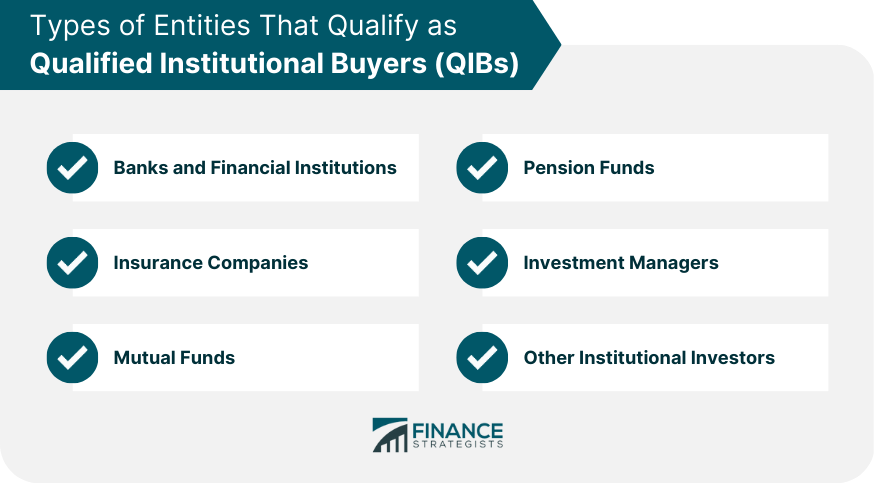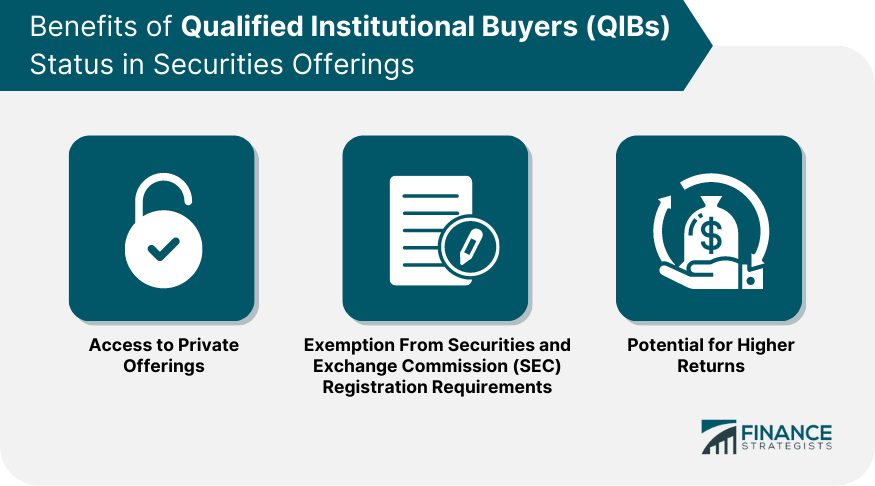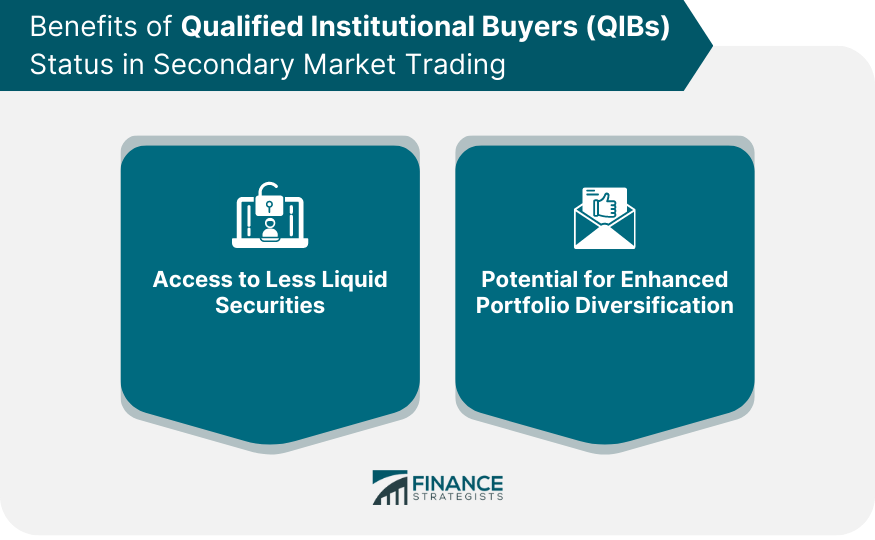Qualified Institutional Buyers (QIBs) are institutional investors with significant assets under management and expertise in the financial markets. These entities are granted certain privileges in securities offerings due to their financial sophistication and ability to manage risks associated with investments. QIBs play a vital role in the financial markets by providing liquidity, fostering market efficiency, and facilitating capital formation for businesses. Their participation in various market segments helps maintain stability and promotes the overall economy's growth. QIBs are subject to a regulatory framework designed to protect investors and maintain market integrity. The U.S. Securities and Exchange Commission (SEC) and other regulatory bodies establish rules and guidelines that govern the activities of QIBs in securities markets. Commercial and investment banks and other financial institutions are considered QIBs due to their significant assets under management, expertise in financial markets, and their role in providing capital and liquidity to businesses and governments. They often participate in securities offerings, debt issuances, and other market activities, acting as intermediaries and key players in the financial markets. Insurance companies, including life and property-casualty insurers, qualify as QIBs because of their substantial assets under management and sophisticated investment strategies. They invest in various asset classes to meet their long-term obligations, such as paying out claims and policy benefits. Their participation in financial markets helps them diversify their investment portfolios and manage risk. Mutual funds are pooled investment vehicles managed by professional investment managers. They qualify as QIBs due to their sizeable assets under management and the expertise of their managers in selecting and managing investments. Mutual funds play a significant role in financial markets by providing retail investors access to diversified investment portfolios and contributing to market liquidity. Pension funds are institutional investors that manage retirement savings for employees of companies, governments, and other organizations. They qualify as QIBs because of their significant assets under management and the need to invest them to meet future pension obligations. Pension funds often have long-term investment horizons and contribute to market stability through their participation in various asset classes. Investment managers, including asset management firms and hedge funds, are considered QIBs due to their substantial assets under management and expertise in managing investments on behalf of clients. These entities employ a wide range of investment strategies and participate in various market segments, contributing to market liquidity and price discovery. Other institutional investors, such as endowments, foundations, and sovereign wealth funds, can also qualify as QIBs based on their significant assets under management and investment expertise. These entities often have unique investment objectives and participate in financial markets to achieve their long-term goals, thereby contributing to market liquidity and efficiency. To qualify as a QIB, an entity must possess a minimum asset threshold. This requirement ensures that QIBs have the financial capacity to participate in large-scale securities offerings and manage the associated risks. QIBs contribute to financial market stability and efficiency by participating in primary and secondary markets, offering liquidity, and fostering market transparency. Rule 144A is a regulation issued by the SEC that allows QIBs to participate in private placements of securities without the need for public registration. This rule aims to streamline the process for issuing securities and facilitate capital raising for businesses. QIBs play a crucial role in private placements by providing capital to businesses seeking to raise funds without the complexities and costs associated with public offerings. One of the primary benefits of being a Qualified Institutional Buyer is the ability to participate in private securities offerings, which are typically unavailable to retail investors. These private offerings may include private placements, pre-IPO placements, and private equity investments. By participating in such offerings, QIBs can access unique investment opportunities, allowing them to diversify their portfolios and potentially achieve higher returns. QIBs benefit from certain exemptions under the U.S. Securities and Exchange Commission regulations, such as Rule 144A. This rule allows QIBs to participate in private securities placements without the issuer going through the time-consuming and costly process of public registration. This exemption simplifies the process of issuing securities and provides QIBs with easier access to a wider range of investment opportunities. Furthermore, the exemption also allows QIBs to trade Rule 144A securities in secondary markets, providing them with enhanced liquidity and the ability to exit their investments more efficiently. QIBs, due to their sophisticated investment expertise and access to a broader range of investment opportunities, may achieve higher returns compared to retail investors. The ability to participate in private offerings and access less liquid securities often provides QIBs with the potential to capture higher returns by investing in companies or assets with significant growth potential. Additionally, QIBs may benefit from favorable pricing and allocation in Initial Public Offerings (IPOs) and other securities offerings, further enhancing their potential for higher returns. In the book-building process, QIBs help determine the appropriate price for a company's shares during an initial public offering by submitting bids based on their valuation of the company. QIBs play a critical role in IPO pricing and allocation, as their bids and demand help set the final offering price and allocate shares among various investors. The participation of QIBs in IPOs is often seen as a positive signal. It can indicate strong institutional interest and support for the company, which may lead to better post-IPO performance. QIBs are permitted to trade Rule 144A securities in secondary markets, enabling them to access a wider range of investment opportunities and potentially enhancing portfolio diversification. Qualified Institutional Buyers enjoy the advantage of being able to trade less liquid securities in secondary markets. These securities may include privately placed bonds, private equity investments, and Rule 144A securities. By gaining access to these less liquid securities, QIBs can tap into unique investment opportunities that may not be available to retail investors. Additionally, trading in less liquid securities can potentially provide higher returns, as these assets may be undervalued or present growth opportunities that the broader market has not yet recognized. Another significant benefit of QIB status in secondary market trading is the potential for enhanced portfolio diversification. As QIBs can access a broader range of investment opportunities, including less liquid securities and private placements, they can build more diversified portfolios, spreading their risks across various asset classes, industries, and geographical regions. Diversification is a key principle in investment management, as it helps mitigate risk and can lead to more stable and consistent returns over time. By accessing a wider range of securities in secondary markets, QIBs can take advantage of diversification benefits, which can help improve their overall portfolio performance and risk-adjusted returns. QIBs are significant players in debt markets, as they often act as primary buyers of newly issued bonds and other debt securities, providing crucial funding for businesses and governments. QIBs can participate in private debt offerings, allowing them to access unique investment opportunities not available to retail investors, which can lead to potentially higher returns and diversification benefits. QIBs contribute to debt market liquidity by actively trading debt securities, thereby promoting price discovery and market efficiency. Their participation in debt markets can influence interest rates and overall market pricing. A high concentration of QIB ownership in certain securities or markets can pose risks, as it may lead to increased volatility, reduced liquidity, and potential market distortion in times of financial stress. The significant influence and market power of QIBs may create opportunities for market manipulation, as these entities may have the ability to move asset prices or create false signals in the market. QIBs are subject to regulatory and compliance risks due to the complex legal framework governing their activities. Non-compliance with regulations can lead to legal and reputational risks and financial penalties. Qualified Institutional Buyers play a crucial role in the financial markets by providing liquidity, fostering market efficiency, and facilitating capital formation for businesses and governments. QIBs contribute to market liquidity and efficiency through their active participation in primary and secondary markets, which promotes price discovery and enables efficient capital allocation. As QIBs hold significant influence in financial markets, regulators need to maintain vigilant oversight and enforce transparency requirements to protect investors and maintain market integrity.What Are Qualified Institutional Buyers (QIBs)?
Characteristics of Qualified Institutional Buyers
Types of Entities That Qualify as QIBs
Banks and Financial Institutions
Insurance Companies
Mutual Funds
Pension Funds
Investment Managers
Other Institutional Investors

Minimum Asset Requirements for QIBs
The Role of QIBs in Financial Markets
The Regulatory Framework for Qualified Institutional Buyers
The U.S. Securities and Exchange Commission (SEC) and Rule 144A
The Role of QIBs in Private Placements
Benefits of QIB Status in Securities Offerings
Access to Private Offerings
Exemption From SEC Registration Requirements
Potential for Higher Returns

QIBs and Initial Public Offerings (IPOs)
Book Building Process in IPOs
The Role of QIBs in IPO Pricing and Allocation
Impact of QIB Participation on IPO Performance
QIBs and Secondary Market Trading
Trading of Rule 144A Securities
Benefits of QIB Status in Secondary Market Trading
Access to Less Liquid Securities
Potential for Enhanced Portfolio Diversification

QIBs and Debt Markets
The Role of QIBs in Debt Issuance
Access to Private Debt Offerings
Influence of QIBs on Debt Market Liquidity and Pricing
Risks and Challenges Associated With QIBs
Risks of Over-Concentration in Institutional Ownership
Potential for Market Manipulation
Regulatory and Compliance Risks
Conclusion
Qualified Institutional Buyers (QIBs) FAQs
Qualified Institutional Buyers (QIBs) are large, sophisticated institutional investors with significant assets under management, such as banks, insurance companies, pension funds, and investment managers. They participate in various financial markets and play a crucial role in providing liquidity, fostering market efficiency, and facilitating capital formation for businesses and governments.
QIBs participate in Initial Public Offerings (IPOs) through the book-building process, where they submit bids based on their valuation of the company. Their bids and demand help set the final offering price and allocate shares among various investors. QIB participation in IPOs is often seen as a positive signal, indicating strong institutional interest and support for the company.
Qualified Institutional Buyers (QIBs) enjoy several benefits in securities offerings, including access to private offerings, exemption from certain SEC registration requirements, and the potential for higher returns due to their ability to invest in less liquid securities and private debt offerings.
The regulatory framework for Qualified Institutional Buyers (QIBs) is crucial to protect investors and maintain market integrity. Regulatory bodies like the U.S. Securities and Exchange Commission (SEC) establish rules and guidelines that govern the activities of QIBs in securities markets, ensuring that they operate transparently and adhere to best practices.
Some risks and challenges associated with Qualified Institutional Buyers (QIBs) include risks of over-concentration in institutional ownership, the potential for market manipulation, and regulatory and compliance risks. Over-concentration can lead to increased volatility and reduced liquidity, while market manipulation can create false signals in the market. Regulatory and compliance risks can result in legal and reputational consequences and financial penalties.
True Tamplin is a published author, public speaker, CEO of UpDigital, and founder of Finance Strategists.
True is a Certified Educator in Personal Finance (CEPF®), author of The Handy Financial Ratios Guide, a member of the Society for Advancing Business Editing and Writing, contributes to his financial education site, Finance Strategists, and has spoken to various financial communities such as the CFA Institute, as well as university students like his Alma mater, Biola University, where he received a bachelor of science in business and data analytics.
To learn more about True, visit his personal website or view his author profiles on Amazon, Nasdaq and Forbes.















